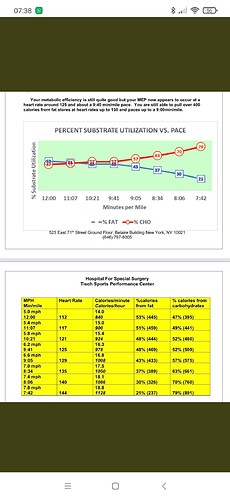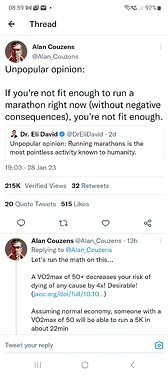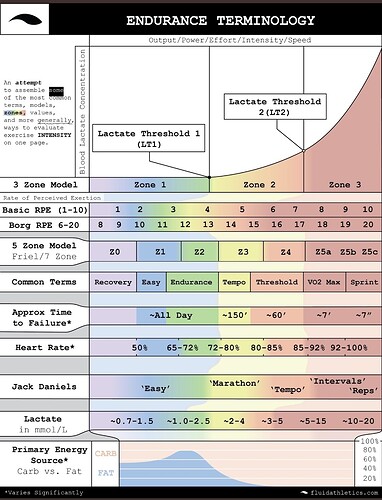Latest Twitter post. Someone asks for data/link to database but he refused to share, and to be fair I dont blame him there if he has spent years compiling this stuff
Thanks, just read the thread. A few tweets down someone posted their (non AC) test results, with declining but not zero fat utilisation even at faster pace. This is more like what I’d assume is correct ![]()
Edit : in fairness we don’t know their VO2max or how close to top end this is
That is what i was unsure of, i thought you always used a small amount of fat until you were using pure stored ATP. @explorerJC is the resident scientist so may have a bit more of an idea.
Reading ACs responses I think he may be using a respiratory exchange ratio of 1.0 to mean “100% carbohydrates” and also acknowledging that this may be an oversimplification ![]()
Don’t know about ‘zero’. But I’ve seen things before that some people can be so metabolically inflexible they have extremely low fat oxidation at very low relative intensities, ie very slow jog in good level runner to require planned walk training.
Whether that extends as far as saying the average person like AC implies I’m even less sure
I am no physiologist, but understand that to be correct…
the predominant source…
Correct…
Can we define negative consequences - or does that mean walking like you’ve crapped yourself and unable to do stairs?
He actually goes on at how everyone should be able to get up, run 7min k’s (sub 5hr) for a marathon and walk away.
Technically, in the main, that’s right though isn’t it. That’s what we’re all designed to do. We’re just extremely good at undoing Mother Nature’s best efforts! ![]()
Not directly related, but just followed Alan and came across this nice graphic of heart rate zones/paces/effort/energy sources and various terminology. Pretty comprehensive…(credit to @fluidathletics)
I really like what he does, willing to put most of his learnings out there. Downside is he thinks everyone needs to “train” a lot and he doesnt accept discourse or challenges
Personally I like the three zone model
easy, medium, hard.
That’ll do
Same, I rarely do medium, except when racing
Also with hard there is “Parkrun” hard and “intervals” hard - both are hard, but different distance.
I remember reading some time ago that genetically we are well adapted to run around 30km, but not designed to run 40km+
Certainly for me, running a half marathon is very easy, so long as pace is zone2 no recovery time is required. Even an easy marathon feel hard and does require recovery time
Nothing new, based on the two lactate thresholds but has limitations as there are a whole heap of different “hards” above 2nd Threshold, all with varying physiological and psychological benefits
Agree, for me, from a practical perspective, hard means as hard as I can go for that distance. So a hard parkrun is 3:45/km @ 170bpm while hard 400m intervals are 3:25/km @ 180bpm and a sprint may 2:50/km @ 190bpm
I have enough experience to know how much I can push, I really don’t look at my watch that much doing hard sessions - intervals I check the pace after each interval and make sure I hit the same on the next; if I get it right, the last interval is very, very painful, and normally a couple of seconds faster than the first
@Hammerer and @explorerJC may have some advice as I could be doing it wrong
the last rep?
if the first rep is still a part of ‘warming into the session’ then yep…but it can change the session outcome if the last rep is significantly faster than the first…
All respectable paces…other than to novices, i am always perplexed as to why coaches prescribe 5k pace for 400m reps…
that’s a reasonable generalisation based on evolutionary biology…
Yes last rep. One of my favourite sets is 400 fast, 200 easy * 5 then 800 easy then 400 fast 200 easy * 5 with the objective of going as fast as possible while still able to hold the same pace for each rep.
The only time I ever run 5k pace on a track is when the interval builds in pace with each rep.


